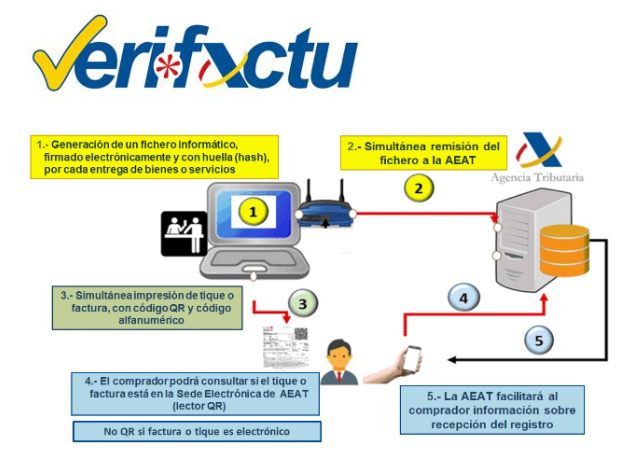What is Verifactu?
Veri*Factu is the new system for issuing verifiable invoices. This measure was born as a result of the Anti-Fraud Law, created with the intention of reducing tax fraud in the country. On the other hand, the Verifactu measure also aims to encourage the digitalization of companies in accounting processes, both in invoicing and taxation.
With this new system, all invoices must be issued digitally. This means that only invoices issued from a system certified by the Tax Agency will be valid. For example, if a company or self-employed person currently issues invoices using tools such as Word, they will no longer be valid.
Although Royal Decree 1007/2023 has already been approved and has come into force, the adaptation period has not yet been defined. For the time being it is still valid to use invoicing methods that are not in digital format. However, taxpayers must be adapted before July 1, 2025.
Although it is not yet mandatory to submit invoices in this way, it is clear that all invoices must be submitted by the Verifactu method, regardless of the size of the company, its turnover or whether it is self-employed.
Currently, a request for a postponement for the implementation of the system has been submitted. If approved, companies should be ready by January 1, 2026 and the self-employed by July 1, 2026.
What are the advantages of Verifactu?
While it is true that this measure requires having a digital invoicing system that is certified by the Treasury, these measures will have numerous advantages, not only to avoid tax fraud, but also for users.
The digitization of accounting is a great advantage for all companies, providing a great time saving for employees and, therefore, will be reflected in economic savings. The digitization of both issued and received invoices has considerable time savings, thanks to digitization systems such as OCR. With Verifactu, invoices will be issued automatically to the Tax Agency, so that manual work will disappear, freeing up resources for other tasks.
In this case we find similarities with the Electronic Invoice. Born with the same objective of reducing tax fraud, connected with the Tax Agency and with the xml format that prevents invoices from being edited or manipulated. In the case of Odoo, the module for electronic invoicing is already developed and operational, fully integrated with invoicing and accounting. In this case, Verifactu is a top priority for Odoo and we are now awaiting the ministerial order to be published in the BOE.
Among the advantages of having an invoicing software that allows the Verifactu system, it is also necessary to comment on the process of digitizing the company. Thanks to systems such as Odoo, which is a comprehensive ERP management, you can not only digitize the accounting but all processes. This allows you to have all operations connected and integrated with each other, facilitating the work not only of the accounting department, but of all areas of the company.
In the same way, self-employed workers will be able to manage all areas of their business without a high cost. This facilitates the management and increases the possibilities of entrepreneurship.

What are Verifactu's requirements?
In order for an invoicing system to be certified to comply with the Verifactu system, it must meet certain requirements. The first requirement is that the system must be able to keep track of invoices in an orderly fashion. It has to be connected to the tax office for the remission of invoices. In addition, the system must ensure that the invoice data cannot be altered.
The data that are sent from each invoice to the Tax Agency are:
- NIF, name and surname or reason of both the issuer and the receiver.
- Invoice serial number
- Invoice date and date of payment
- Specification of whether it is a complete invoice or a simplified invoice
- Description of the transactions
- Amount: taxable and total amount
- Computer system identification code and registration record code
- Exact time at which the registration invoice record is generated
- QR
In the Order HAC/1177/2024 published in the BOE on October 17, the latest updates on the requirements for VeriFactu can be found. Articles 3, 5 and 16 detail the requirements for Verifiable Invoice Issuing Systems or VeriFactu.
How will it work in Odoo?
Verifactu will have a methodology similar to that of SII or TicketBAI. With the complete configuration, you will have a direct connection via EDI for the automatic sending of invoices to the Tax Agency.
However, Verifactu will be required only for sales invoices, so there will be the possibility of using only the SII to submit invoices, leaving the choice to each one.

